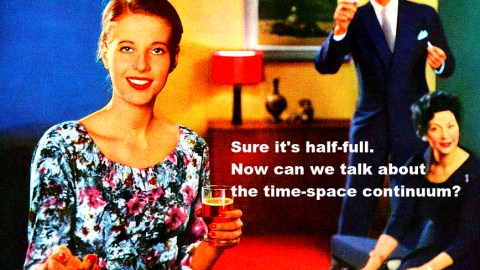Is There Such a Thing as an Intelligent Optimist?

Caveat permanentum: Very little in this blog is research-based. I’m not against those things, but other people are much better at them than I am. So while I’d love to have you stick around, if you’re looking for links, stats, and references, you’ll find them elsewhere.
I half-remember a recent quote from the satirist Howard Jacobson, author of The Finkler Question, to the effect that all intelligent people are pessimists. LMGTFY (let me Google that for you). OK, here it is:
“I have never met an intelligent optimist. That is not to say I think pessimism makes you intelligent, but I have always felt like an Old Testament Jeremiah or Cassandra from ancient Greece. I want to run down the streets warning people.”
Now it’s well-established (and completely obvious) that optimism is a bit delusional, especially if you don’t believe in some form of Heaven or live in a hermetically sealed Utopian community where life has been carefully engineered to maximize human happiness and minimize (or hide) pain. After all, the best you can say about life is that some really cool things can potentially happen, most potently in the form of love for friends and family, secondarily in creative highs and moments of career success. You might also be able to turn a National Geographic-esque eye on nature’s wondrous richness and variety, if you’re in the right mood. Otherwise, as Hamlet puts it in that beautifully bipolar speech: “What, to me, is this quintessence of dust?” No matter how you slice it, life contains a great deal of suffering, in the form of loss, aging, sickness, and death.
So unless they’re in pathological denial about all this, how can anyone be an optimist, unless they’re a complete idiot?
I wonder how Jacobson would define intelligence. It is true that optimism is not seated on a divan, smiling wryly with a cup of rare Chinese tea in its hand. In some ways, optimism is like a golden retriever puppy, hopping around with its tongue hanging out, going, “What’s next? What’s next? Frisbee?”
But is this cool, reserved stereotype of intelligence too restrictive? I think I have to hope so, because I’m at least half an optimist. Maybe it’s the Italian half of my Jewtalian brain? Hey — Jacobson’s the one who brought up Jeremiah. Or maybe it’s the American in me, Jacobson, after all, is English — possibly a more significant risk factor for pessimism than intelligence and Jewishness combined.
Assuming we can agree that people, like plants, have inborn, biological potential that can be nourished or stunted by environment, and leaving aside such catastrophic environmental factors as war, insane parents, or childhood cancer, mindset (optimistic, pessimistic, or somewhere in between) is a kind of interpretive filter operating ambiently in the background. If it’s a matter of the temperament you’re born with, then it’s nature and nurture combined, because it shapes how you interact with the world. What I think of as my own personal “optimism” is a tendency to look forward to things, an excitement about what’s possible. An eagerness, for example, to write this blog from week to week just to see what comes next. Another aspect of optimism is the tendency to think everything and everyone is just peachy (as opposed to horrible and out to destroy you).
Here’s where it gets a little muddy for me, personally. Because for all my enthusiasm and zest for life, good conversation, and the future, I can be intensely paranoid, critical and convinced that all is hopeless and doomed to ruin. I’d love to discuss all this with Jason Silva, a guy I’ve had the pleasure of interviewing a couple times who is possibly the most optimistic person I’ve ever met (interestingly, and not, I think, coincidentally, he also told me in one of those interviews that he’s absolutely terrified of death and therefore hopeful that science will overcome this major bummer in his lifetime).
“Negative capability” is one of those ideas that seems applicable to just about any topic. John Keats (who coined the term) says Shakespeare’s genius, for example, lay in his “negative capability” to hold a thing and its opposite in his mind at the same time. Negative capability is imagination: the ability to suspend disbelief in things that don’t exist and to follow them where they lead.
Keats contrasts negative capability with what he calls “an irritable reaching after fact and reason.” This pessimism — the voice that kills the conversation. Optimism, at its best, is a form of negative capability. It’s narrowly escaping the fall of your homeland to Nazism, as Einstein did, only to spend the rest of your life in eager pursuit of knowledge. I don’t know whether or not Jacobson would consider me intelligent, but I doubt he’d question Einstein’s eligibility for Mensa membership. And I don’t know enough about Einstein (or optimism, for that matter) to judge whether he was a total or a partial optimist, but everything I’ve read that he allegedly said or wrote tells me that for all his formidable intellect, there was often a little song in that heart.
The last thing I want to say about this is that optimism, like imagination, is childish in the best sense of the word. And that just about every great artist or thinker I’ve ever heard interviewed has said something to the effect that great artists and thinkers manage somehow to hold on to the child in themselves rather than smothering it, as most grown-ups do. Maybe this is where we get confused, and those of dour or at least more sober temperament conflate optimism with stupidity.
But for all I’ve seen and know of the world — thank you very much Howard — I think I’d much rather be an intelligent man-child — exploring, making crazy things up, and asking tons of annoying questions — than an intelligent grown-up any day.
—
talk to @jgots on Twitter
. . . do you embrace the geek? Then you will love episode 4 of Think Again – A Big Think Podcast, LIVE on iTunes, Soundcloud, and Stitcher. Bill Nye guests and Jason Gots hosts.





